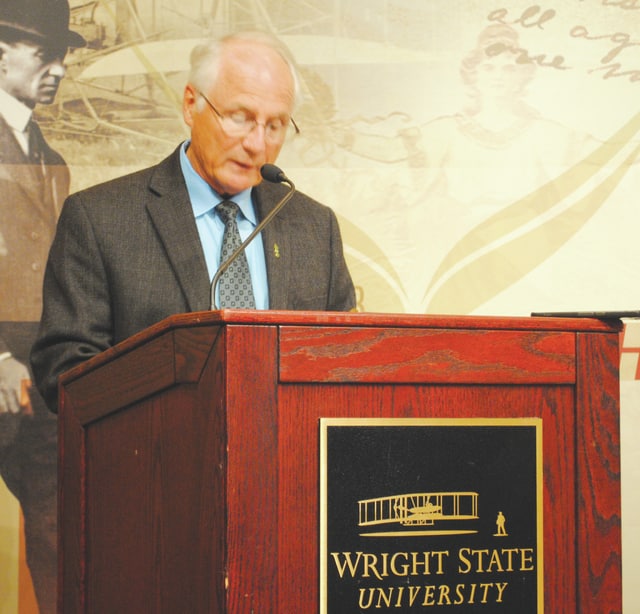
By Whitney Vickers and Nathan Pilling
[email protected] and [email protected]
FAIRBORN — Greene County community leaders were disappointed Tuesday following the announcement by Wright State University that it would no longer host the first presidential debate of the 2016 election cycle.
The event had inspired a number of community leaders to come together to showcase the region, which sparked the creation of the Greene County Debate Task Force. The group included chamber of commerce leaders, the Greene County Convention and Visitors Bureau and local government leaders from Greene County, as well as the cities of Fairborn and Beavercreek.
“I think of all the hours the Greene County Debate Task Force put in together in support of the Wright State debate — we’re disappointed,” said Paul Newman Jr., executive director of the Fairborn Area Chamber of Commerce and member of the Greene County Debate Task Force. “However, we’re sure it was a difficult decision for [Wright State University President] Dr. Hopkins, and we’re sure it was a prudent decision.”
The school requested that the Commission on Presidential Debates “release Wright State University from [its] obligation to host the first presidential debate” on Tuesday, Hopkins said in a press conference, citing security concerns and rising costs as the reasons for the request.
“Wright State has a responsibility for the safety and well-being of those on our campus and the surrounding area,” he said. “We all take this responsibility very, very seriously. Over the last few weeks, we’ve had a growing concern about what it would take to guarantee the safety and security of our campus. Having a large, open campus, accessible to the public, led to concerns about whether we could ensure the safety and security of those on and around our campus during the debate.”
The conversation between the university and the CPD relaying the possibility that Wright State would no longer host the event started in early June, but Hopkins said recent violent events around the country finalized his decision.
“Security expenses have escalated much higher than expected,” he said. “The additional costs created unnecessary financial burden on our university during a time when we are in the midst of an important financial remediation plan. Fundraising efforts have not kept up with the necessary security costs, complicating our ability to provide adequate safety.”
Previous estimates indicated that the event, which was scheduled to take place Sept. 26, would have drawn 3,000-4,000 media members, as well as other attendees.
Greene County Commissioner Tom Koogler echoed the disappointment of other community leaders, pointing to the millions of dollars the event could have brought in to the region.
“It’s going to have obviously an impact on what we were looking forward to: a robust period of time with our economy, with all the influx of people coming in and the spending of dollars, but Greene County is in good condition and we’ll recover from it,” he said. “It’s just a disappointment, because it could have very well been a real feather in not only Greene County’s hat, but the Miami Valley and Wright State’s hat, being something very positive.”
Koogler said county officials had “some discussion” with Wright State officials about Greene County providing some financial support to the event, but that no commitments were made.
Wright State’s decision handed the reigns over to Hofstra University in New York to host the first presidential debate of the 2016 presidential election.
Previous conversations between Wright State and former debate host sites led the university to estimate that it would spend approximately $3-5 million to house the event. Hopkins said the institution was confident in its ability raise that amount between community and state support.
As the event drew closer, estimates climbed to $5-6 million, which Hopkins said would have primarily went toward cyber security costs. Wright State recently re-budgeted a total $8 million for the event. Hopkins said the total costs were beyond what the higher education institute had budgeted.
“In fact, we’re still trying to figure out what the security costs will be in total, but they’re estimating beyond what we had planned for the budget,” Hopkins said. “We cannot afford, as a university that’s trying to manage [its] budget to be fiscally sound, to take on these costs.”
Wright State has spent $2.5 million in preparation for the event so far, which includes construction costs for improving the university’s Nutter Center, where the debate would have been hosted. Wright State expects to recoup some costs, but talks between the school and CPD will determine what will ultimately happen to those funds.
Hopkins said he had higher hopes for fundraising efforts surrounding the event, adding that most of the incoming money had just been pledged. Donors who already made contributions will be asked if they would like for their dollars to instead go toward supporting educational activities on campus in relation to the debate.
He said the Nutter Center could host a debate watch party for students the night the presidential candidates would have been facing off under that roof. Wright State also had a number of events scheduled to take place the weekend leading up to the event, which Hopkins said could be turned into a “debate festival.”
“I hope, although we won’t be hosting the debate at the Nutter Center, everything else we had been planning to leverage as learning experiences around the debate, will go forward,” Hopkins said.


